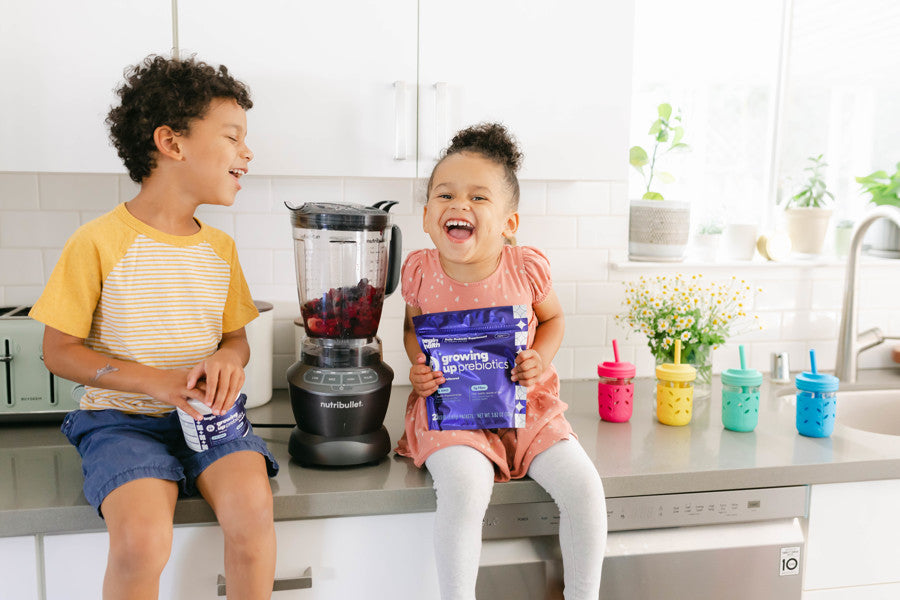Your Cart is Empty
Continue shoppingCan Magnesium Help Constipated Toddlers?
Medically Reviewed by May Zhu, RDN | Published December 20, 2024
share this article

Constipation is a common issue among toddlers, often caused by dietary changes, toilet training, or inadequate fiber and water intake.
Struggling with infrequent or hard-to-pass stools can lead to discomfort and even anxiety during bathroom visits.
While there are several remedies to help support toddler constipation symptoms, families often opt for magnesium as a gentle, natural option to support healthy digestion.
What Is Magnesium?
Magnesium is a vital mineral involved in over 300 enzymatic processes in the body, including muscle function, nerve signaling, and energy production (Rude et al., 2009).
In digestion, magnesium plays a unique role by acting as an osmotic agent, drawing water into the intestines to soften stool and promote bowel movements.
This natural mechanism makes magnesium an effective, non-habit-forming option for relieving occasional constipation in toddlers.
Here are 4 Dietitian recommended foods to help your toddlers poop.
How Magnesium Eases Constipation
-
Softens Stool
Magnesium increases water content in the colon, which helps soften stools and makes them easier to pass (Forootan et al., 2018). This can provide relief for toddlers dealing with hard or dry stools. -
Promotes Regularity
By relaxing intestinal muscles, magnesium aids in the movement of stool through the digestive tract. This helps maintain a regular bowel schedule, essential for toddlers learning toilet habits (Castiglioni et al., 2013). -
Balances Electrolytes
Magnesium works in harmony with other minerals, such as potassium, to support overall hydration and electrolyte balance. This balance is key to preventing constipation symptoms such as painful stooling (Guerrera et al., 2009).
Is Magnesium Safe for Toddlers?
Magnesium is generally safe for toddlers when used within age-appropriate limits. The upper tolerable limit for toddlers aged 1-3 years is 65 mg/day for supplemental magnesium (National Institutes of Health, 2021).
However, exceeding this amount can lead to side effects like diarrhea or abdominal cramps, so it’s important to follow dosing recommendations and consult a pediatrician before introducing any magnesium supplement.
Sources of Magnesium for Toddlers
Magnesium can be found naturally in a variety of foods, though picky eating habits can make it challenging to ensure toddlers get enough. Toddler-friendly foods rich in magnesium include:
- Bananas
- Kiwi
- Pumpkin seeds (finely ground for safety)
- Spinach (blended into smoothies or purees)
If dietary intake is insufficient, magnesium supplements designed specifically for toddlers can help bridge the gap. Opt for powder formulations that are easy to mix into water, milk, or food for convenience.
Additional Tips for Helping Constipation Symptoms in Toddlers
While magnesium can be an effective tool, it only works best alongside a well-rounded approach to gut health.
Ensure your toddler drinks plenty of water, consumes fiber-rich fruits and vegetables, and stays physically active.
Establishing a regular bathroom routine can also reduce anxiety and encourage healthy bowel habits.
Conclusion
Magnesium can be a safe and effective way to ease occasional constipation in toddlers, working naturally to soften stool and promote regularity. When paired with proper hydration, a balanced diet, and healthy routines, magnesium can support your little one’s digestive health, helping to make bathroom struggles a thing of the past.
Summary
Magnesium helps constipated toddlers by softening stool, promoting regularity, and supporting hydration. It’s a safe and effective option when used appropriately and combined with healthy dietary and lifestyle habits.

Author
May Zhu, RDN
Trending

How to Transition Kids Off Stool Softeners Safely
read now
How to Know If Your Kid Needs a Stool Softener (or Something Else)
read now
Why Parents Are Choosing Prebiotics Over Stool Softeners for Kids
read now






